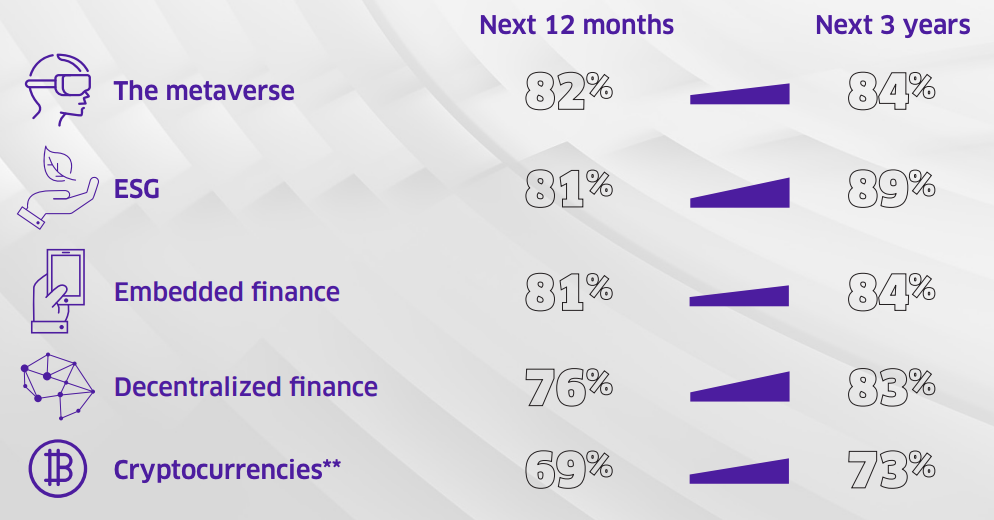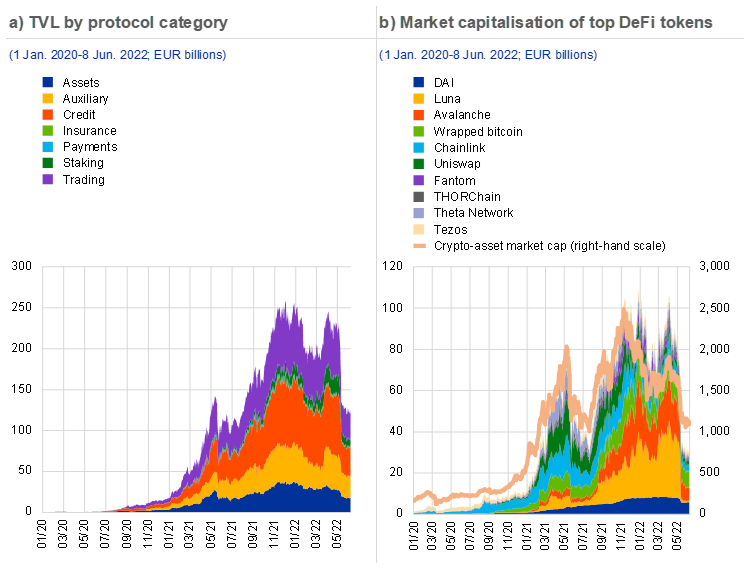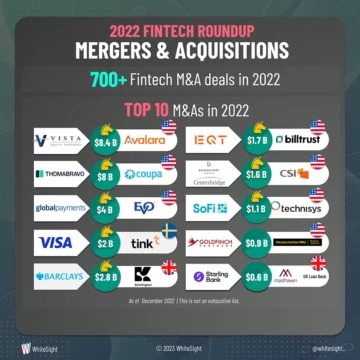In Singapore, c-suite and senior finance executives are planning to invest significantly in embedded finance, environmental, social and governance (ESG) frameworks, and blockchain-related innovations in 2023, confident that these technologies will create new growth opportunities and provide them with an edge over competitors, a new study by Fidelity National Information Services (FIS), an international provider of financial services technology and outsourcing services, found.
The inaugural 2023 Global Innovation Report, released on January, shares findings of a global study of 2,000 executives which sought to uncover finance executives’ top areas of investment in 2023 and the years onwards.
Results from the Singapore survey, which saw the participation of 160 executives, show that finance executives are particularly optimistic on the prospects of embedded finance, sustainability as well as decentralized finance (DeFi), believing that these innovations will help them strengthen their brands and retain customers.
Of the Singapore finance executives surveyed, more than two-thirds of the respondents said these major innovations will impact their businesses in the next 12 months. The impact will be sustained over a three-year horizon but will accelerate for ESG, DeFi and cryptocurrencies, the research found.

Will these innovations impact your businesses in the next 12 months, three years?, Source: 2023 Global Innovation Report, FIS, Jan 2023
Addressing data challenges to tap into ESG opportunities
For financial services firms in Singapore, ESG is an important opportunity to improve their competitiveness in the market (73%) and 59% of respondents said they are currently developing new products and services to tap into this opportunity.
Respondents also said they are actively addressing the biggest challenges around ESG, which revolve around accessing and analyzing relevant data, as well as reporting on that data. 66% of respondents said they are investing in technology to improve their ESG reporting and disclosures, and 61% are investing in technology to provide more granular ESG ratings of assets and securities.
“ESG is a competitive advantage that should not be sidelined,” Kanv Pandit, Group Managing Director, APAC, Banking Solutions at FIS, said in a statement.
“A strong ESG score and the transparency to back it up is also critical to capturing the growing number of investors who are putting ESG front and center when they decide where to invest.”
Eagerness to embrace ESG standards in Singapore’s finance sector comes on the back of a push from the government to turn the city-state into a leading center for green and sustainable finance, not just in Asia but globally.
In 2019, the Monetary Authority of Singapore (MAS) introduced the Green Finance Action Plan (GFAP), complementing the Singapore Green Plan 2030 and laying out MAS’ sustainable finance strategy.
This strategy is articulated around five pillars: strengthening the financial sector’s resilience to environmental risks; enhancing sustainability-related disclosures; developing green and transition finance solutions and markets; harnessing technology to enable trusted and efficient sustainable finance flows; and building knowledge and capabilities in sustainable finance.
Sustainable finance activity in Singapore has accelerated significantly over the past few years. From 2018 to 2021, over S$39.8 billion of green and sustainability-linked loans have been issued in the city-state, according to MAS’s Sustainability Report 2021/2022. Notably, sustainability-linked loans experienced continued growth with a quadrupling of volumes from 2019 levels.
Interest in DeFi picks up despite slumping crypto markets
DeFi, a concept which refers to the provision of financial instruments without the need of intermediaries, is another emerging trend which Singapore finance executives are bullish on, the FIS study found.
Commonly described as an alternative financial system, DeFi applications use blockchain and digital assets to manage financial transactions. Participants are part of a peer-to-peer network where assets represented can be transferred automatically via so-called smart contracts.
For more than half of the Singapore financial executives surveyed by FIS (56%), DeFi represents a major growth opportunity for their organization. 59% of respondents believe DeFi will strengthen the competitiveness of fintech companies and other disruptive rivals in financial services.
Pandit said that although the ongoing, prolonged crypto winter will likely continue to challenge the industry, the blockchain and digital asset industry continues to see innovation and adoption, citing central bank digital currency (CBDC) advancements, increased institutional adoption of digital assets, and pilot launches of involving underlying technologies.
“These initiatives are driven by a long-term technology investment cycle and outlook, which most industry participants agree has not changed,” Pandit said.
“There are still pockets in which growth and investment continue at a strong pace.”
The size of the DeFi has grown exponentially over the past few years. In 2021, the sum of all digital assets deposited in DeFi protocols, also referred to as the total value locked (TLV), increased from approximately EUR 18 billion in January to over EUR 240 billion by the end of December, according to a report by the European Central Bank. During the same period, DeFi tokens, the cryptocurrencies used in DeFi protocols, experienced an almost tenfold increase.

Crypto-assets deposited in DeFi protocols (TVL) and the market capitalisation of top DeFi tokens, Source: European Central Bank, 2022
The rise of embedded finance
Another trend outlined in the FIS report is the rise of embedded finance, a growing movement which refers to the integration of financial services like lending, payments and insurance into non-financial businesses’ infrastructures.
For end users, embedded finance means a smoother and more seamless experience where financial services are integrated into their day-to-day software rather than being only accessible through standalone services from traditional financial institutions. For businesses, embedded finance means increased consumer satisfaction and improved retention. And for financial services firms, embedded finance allows them to extend their reach by reducing the cost of acquiring customers.
“Embedded finance is when consumers have unique, tailored financial services delivered to them at the point of need by non-financial companies. It is empowering non-financial firms to boost revenues (forecasted to exceed a staggering US$183 billion globally in 2027) by delivering lucrative value-added services like in-app payments, lending and insurance to customers as part of a seamless experience,” Pandit said.
“We can expect to see businesses in Singapore pick up the pace in embracing embedded finance as they seek to diversify their offerings and deepen customer loyalty through this period of economic uncertainty.”
Of the 160 finance executives polled by FIS, 41% said they will invest significantly in developing embedded finance products within 12 months. 37% of those that are already offering or developing embedded finance services believe these solutions will help them improve their brand, image and reputation.
Featured image credit: Edited from Unsplash and Freepik here and here.
- SEO Powered Content & PR Distribution. Get Amplified Today.
- Platoblockchain. Web3 Metaverse Intelligence. Knowledge Amplified. Access Here.
- Source: https://fintechnews.sg/69579/green-fintech/singapores-fsi-sector-eyes-significant-investments-in-esg-embedded-finance-and-defi/
- 000
- 12 months
- 2018
- 2019
- 2021
- 2022
- 2023
- 7
- a
- accelerate
- accelerated
- accessible
- accessing
- acquiring
- Action
- actively
- activity
- addressing
- Adoption
- advancements
- ADvantage
- All
- allows
- already
- alternative
- Although
- analyzing
- and
- Another
- APAC
- applications
- approximately
- areas
- around
- asia
- asset
- Assets
- authority
- automatically
- back
- Bank
- Banking
- being
- believe
- believing
- Biggest
- Billion
- blockchain
- Blockchain-related
- boost
- brand
- brands
- Building
- Bullish
- businesses
- C-suite
- capabilities
- Capitalisation
- caps
- Capturing
- CBDC
- Center
- central
- Central Bank
- central bank digital currency
- central bank digital currency (CBDC)
- challenge
- challenges
- Companies
- competitive
- competitiveness
- competitors
- concept
- confident
- consumer
- Consumers
- continue
- continued
- continues
- contracts
- Cost
- create
- credit
- critical
- crypto
- Crypto Winter
- crypto-assets
- cryptocurrencies
- Currency
- Currently
- customer
- Customer Loyalty
- Customers
- cycle
- data
- day-to-day
- December
- decentralized
- Decentralized Finance
- decentralized finance (DeFi)
- Deepen
- DeFi
- DeFi protocols
- defi tokens
- delivered
- delivering
- deposited
- described
- Despite
- developing
- digital
- Digital Asset
- Digital Assets
- digital currency
- Director
- Disclosures
- disruptive
- diversify
- driven
- during
- ECB
- Economic
- Edge
- efficient
- embedded
- Embedded Finance
- embrace
- embracing
- emerging
- empowering
- enable
- enhancing
- environmental
- ESG
- Ether (ETH)
- EUR
- Europa
- European
- European Central Bank
- exceed
- executives
- expect
- experience
- experienced
- exponentially
- extend
- Eyes
- few
- fidelity
- finance
- financial
- Financial institutions
- Financial Instruments
- financial services
- financial system
- fintech
- Fintech Companies
- firms
- FIS
- Flows
- found
- frameworks
- friendly
- from
- front
- Global
- Globally
- governance
- Government
- Green
- Green Finance
- Group
- Growing
- grown
- Growth
- Half
- Harnessing
- help
- horizon
- HTML
- HTTPS
- image
- Impact
- important
- improve
- improved
- in
- Inaugural
- Increase
- increased
- industry
- information
- infrastructures
- initiatives
- Innovation
- innovations
- Institutional
- Institutional Adoption
- institutions
- instruments
- insurance
- integrated
- integration
- intermediaries
- International
- introduced
- Invest
- investing
- investment
- Investments
- investor
- Investors
- Issued
- IT
- Jan
- January
- knowledge
- launches
- leading
- lending
- levels
- likely
- Loans
- locked
- long-term
- Loyalty
- lucrative
- major
- manage
- managing
- Managing Director
- Market
- Market capitalisation
- Markets
- MAS
- max-width
- means
- Monetary
- monetary authority
- Monetary Authority of Singapore
- Monetary Authority of Singapore (MAS)
- months
- more
- most
- movement
- National
- National Information
- Need
- network
- New
- new products
- next
- notably
- number
- offering
- Offerings
- ongoing
- opportunities
- Opportunity
- Optimistic
- organization
- Other
- outlined
- Outlook
- Outsourcing
- Pace
- part
- participants
- participation
- particularly
- past
- payments
- peer to peer
- period
- pick
- Picks
- pilot
- plan
- planning
- plato
- Plato Data Intelligence
- PlatoData
- pockets
- Point
- Products
- Products and Services
- prospects
- protocols
- provide
- provider
- provision
- Push
- Putting
- ratings
- reach
- reducing
- referred
- refers
- relevant
- report
- Reporting
- represented
- represents
- reputation
- research
- resilience
- retention
- return
- revenues
- Rise
- risks
- rivals
- Said
- same
- satisfaction
- seamless
- sector
- Securities
- Seek
- senior
- Services
- Shares
- should
- show
- significant
- significantly
- Singapore
- Singapore’s
- Size
- smart
- Smart Contracts
- smoother
- Social
- Software
- Solutions
- Source
- standalone
- standards
- Statement
- Still
- Strategy
- Strengthen
- strengthening
- strong
- Study
- Survey
- surveyed
- Sustainability
- sustainable
- sustained
- system
- tailored
- Tap
- Technologies
- Technology
- The
- their
- three
- Through
- to
- Tokens
- top
- Total
- total value locked
- traditional
- Transactions
- transferred
- transition
- Transparency
- Trend
- trusted
- TURN
- TVL
- two-thirds
- Uncertainty
- uncover
- underlying
- unique
- use
- users
- value
- via
- volumes
- which
- WHO
- will
- Winter
- within
- without
- years
- Your
- zephyrnet













